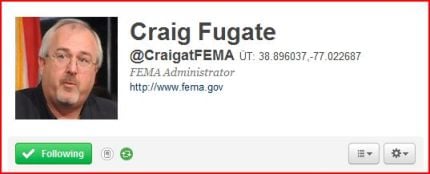Agencies Must Adapt to How People Use Information: FEMA Official
02/24/2011 -WASHINGTON - If people are using Twitter.com and relying on their mobile phones to receive and provide information, then government agencies should adapt to that, W. Craig Fugate, adminstrator of the Federal Emergency Management Agency (FEMA), told a homeland security conference yesterday.
Fugate reiterated that view in an interview with Security Management following the panel discussion "Collaboration when Disaster Strikes" at the AFCEA Homeland Security Conference held at the Ronald Reagan International Trade Center.
(For more on Fugate and FEMA's use of Twitter and social media, please see "Bird's Eye View" by Joseph Straw , published in the February issue of Security Management).
Twitter allows individuals to push out 140-character posts called "tweets" and follow other Twitter users, whose posts are aggregated into an easy-to-read chronological feed. Users can also add a hashtag to their posts, which provides searchability. For example, the hashtags for the recent earthquake that struck Christchurch, New Zealand, are#chch and#eqnz..
Fugate has long held a reputation as a technology advocate. Before he was at FEMA, he was director of the Florida Division of Emergency Management, and he told Security Management that he set up an exercise there that tracked how long it took to get a response when information was pushed out on Twitter rather than relying on, say, e-mail. He looks at it not as "doing new things," but as "a way to do things we've always done in a faster way."
"The public is not a liability, it's a resource," said Fugate during the panel session.
Fugate revealed that many in the government tend to view public information as a liability and untrustworthy, but he points out that even censored official government platforms disseminate bad information now and then. But things like Twitter feeds provide opportunities to crowdsource and advance situational awareness.
One example Fugate noted was a man who was tweeting him weather updates during a tropical cyclone in American Samoa. Halfway through the storm, the man started tweeting NFL score updates. Fugate said that meant that the man still had satellite reception, the storm wasn't that bad, and the tweeter was a Packers fan.
Fugate stressed that it's important to adapt to the way the public is using information, and not just rely on old methods of pushing out messages, such as providing media interviews. If the public is relying on their cell phones and Twitter in an emergency, then agencies should leverage that, says Fugate.
He would like to see agencies develop Web sites that are practical to mobile users. For instance, when a user visits an agency's Web site on a smartphone, they will see useful information all at the top—such as numbers to call in an emergency. And he thinks that if agencies produce data feeds, such as a list of where disaster recovery centers are, it will not be long before there will be an application developed that will help users find the nearest one.
Fugate believes that if the information is pushed out in ways that the public can use, people will figure out the ways to best use it in a crisis.
